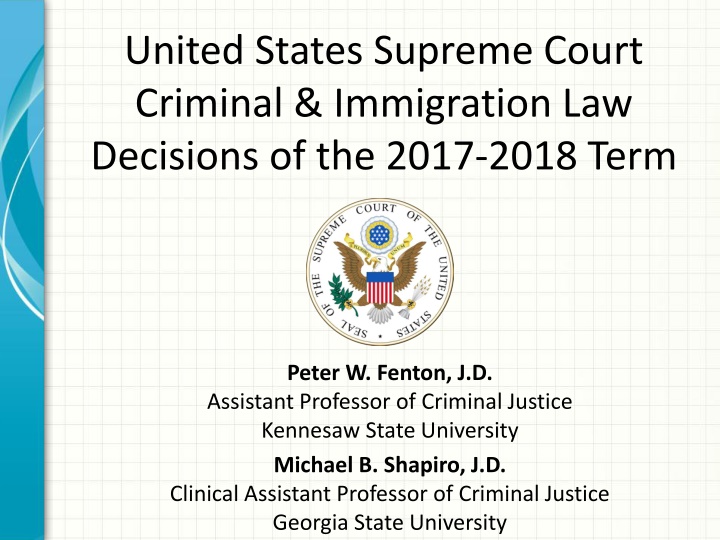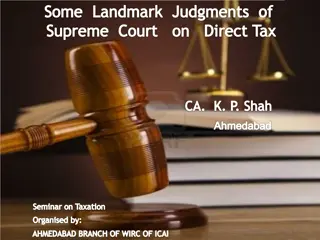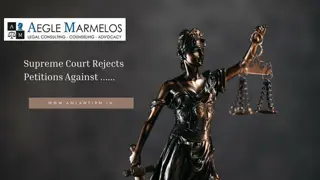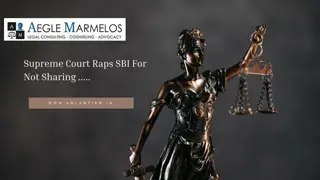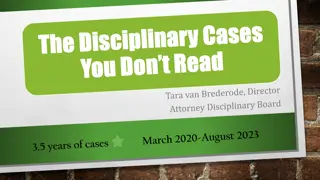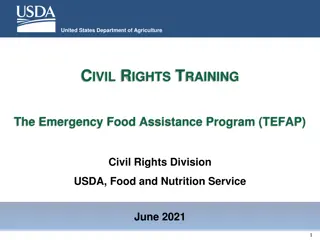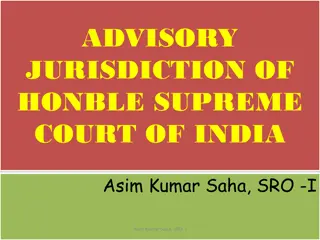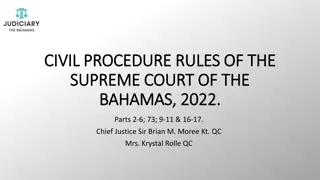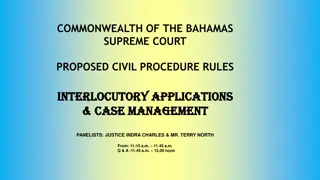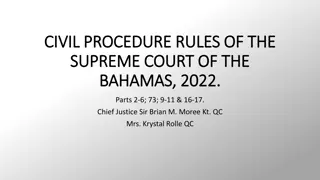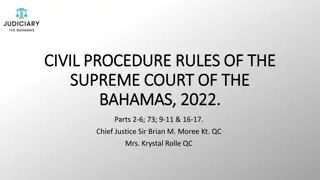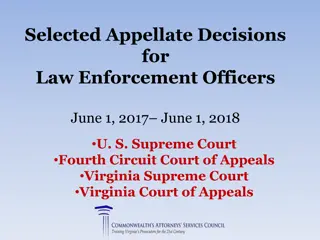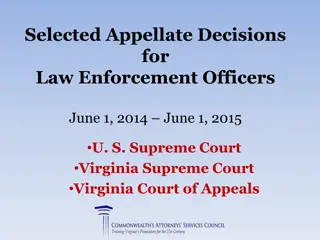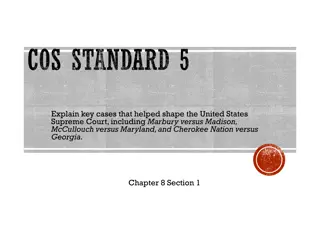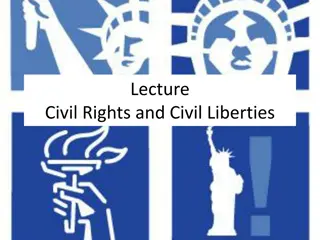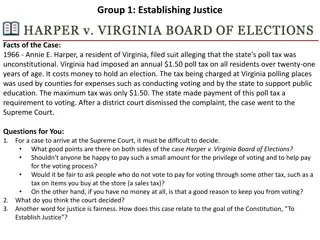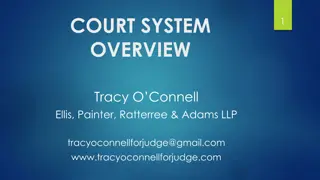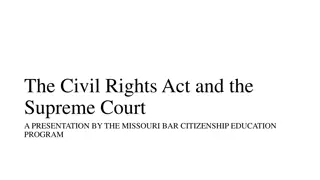Supreme Court Decisions 2017-2018: Civil Rights & Ineffective Assistance
Key rulings from the 2017-2018 term of the United States Supreme Court, including cases on civil rights and ineffective assistance of counsel. Delve into decisions impacting criminal and immigration law, with insights from legal experts. Understand the nuances of cases like Murphy v. Smith and Ayestas v. Davis, dissecting important legal principles and implications.
Download Presentation

Please find below an Image/Link to download the presentation.
The content on the website is provided AS IS for your information and personal use only. It may not be sold, licensed, or shared on other websites without obtaining consent from the author.If you encounter any issues during the download, it is possible that the publisher has removed the file from their server.
You are allowed to download the files provided on this website for personal or commercial use, subject to the condition that they are used lawfully. All files are the property of their respective owners.
The content on the website is provided AS IS for your information and personal use only. It may not be sold, licensed, or shared on other websites without obtaining consent from the author.
E N D
Presentation Transcript
United States Supreme Court Criminal & Immigration Law Decisions of the 2017-2018 Term Peter W. Fenton, J.D. Assistant Professor of Criminal Justice Kennesaw State University Michael B. Shapiro, J.D. Clinical Assistant Professor of Criminal Justice Georgia State University
The Very Best, or Worst, 25 Cases Staring blindly into space Getting up to splash my face Wanting just to stay awake Wondering how much I can take
Flying Fickle Finger of Fate Award Worst Decision of the Term
Murphy v. Smith No. 16-1067, decided February 21, 2018 Civil Rights, Attorney s Fees Gorsuch, majority. Sotomayor, dissenting. Facts: Petitioner Charles Murphy was awarded a judgment in his federal civil rights suit against two of his prison guards, including an award of attorney s fees. Pursuant to 42 U. S. C. 1997e(d)(2), which provides that in such cases a portion of the [prisoner s] judgment (not to exceed 25 percent) shall be applied to satisfy the amount of attorney s fees awarded against the defendant, the district court ordered Mr. Murphy to pay 10% of his judgment toward the fee award, leaving defendants responsible for the remainder. The Seventh Circuit reversed, holding that 1997e(d)(2) required the district court to exhaust 25% of the prisoner s judgment before demanding payment from the defendants. Holding: In cases governed by 1997e(d), district courts must apply as much of the judgment as necessary, up to 25%, to satisfy an award of attorney s fees.
AND YOU THOUGHT LAST YEARS PRESENTATION WAS AS GOOD AS IT GETS!
Ayestas, aka Zelaya Corea v. Davis, Director, Texas Department of Criminal Justice, Correctional Institutions Division No. 16-6795, decided March 21, 2018 Ineffective Assistance of Counsel Alito majority. Sotomayor concurring. Facts: Ayestas was convicted of murder and sentenced to death in a Texas state court. A third legal team sought, unsuccessfully, state habeas relief, claiming trial-level ineffective assistance of counsel but not counsel s failure to investigate petitioner s mental health and alcohol and drug abuse during the trial s penalty phase. His fourth set of attorneys did raise that failure in a federal habeas petition, but because the claim had never been raised in state court, the District Court held, it was barred by procedural default. Petitioner filed an ex parte motion asking the District Court for funding to develop his claim that both his trial and state habeas counsel were ineffective. The court found his claim precluded by procedural default and thus denied his funding request. Holding: A funding applicant must not be expected to prove that he will be able to win relief, but the reasonably necessary test does require an assessment of the likely utility of the services requested.
Byrd v. United States No. 16-1371, decided May 14, 2018 Fourth Amendment, Reasonable Expectation of Privacy in Rental Car Kennedy majority. Thomas concurring. Alito concurring. Facts: Reed rented a car while Byrd waited outside. The agreement warned that permitting an unauthorized driver to drive the car would violate the agreement. Reed listed no additional drivers on the form, but she gave the keys to Byrd. When Byrd for a traffic infraction, Pennsylvania State Troopers learned that the car was rented, that Byrd was not listed as an authorized driver, and he had prior drug and weapons convictions. Byrd admitted he had a marijuana cigarette in the car. The troopers proceeded to search the car, discovering body armor and 49 bricks of heroin in the trunk. The District Court denied Byrd s motion to suppress the evidence as the fruit of an unlawful search, and the Third Circuit affirmed, concluding that, because Byrd was not listed on the rental agreement, he lacked a reasonable expectation of privacy in the car. Holding: The mere fact that a driver in lawful possession or control of a rental car is not listed on the rental agreement will not defeat his or her otherwise reasonable expectation of privacy.
Carpenter v. United States No. 16 402, decided June 22, 2018 Fourth Amendment, Warrantless Cell Phone Location Roberts majority. Kennedy, Thomas & Gorsuch dissenting separately. Facts: When a phone connects to a cell site, it generates a time-stamped record known as cell-site location information (CSLI), which wireless carriers collect and store for business purposes. The FBI identified cell numbers of robbery suspects, prosecutors were granted court orders to obtain records under the Stored Communications Act, revealing 12,898 location points cataloging Carpenter s movements over 127 days (101 data points/day). Carpenter moved to suppress, arguing that the seizure of the records without a warrant supported by probable cause violated the Fourth Amendment. The District Court denied the motion, and based on records showing his phone near four robbery locations, Carpenter was convicted. The Sixth Circuit affirmed, holding that Carpenter lacked a reasonable expectation of privacy in the location information collected by the FBI because he had shared that information with his wireless carriers. Holding: This was a Fourth Amendment search, and an order issued under 18 U.S.C. 2703(d) is not a permissible mechanism for accessing historical cell-site records. However, a warrant is required only in the rare case where the suspect has a legitimate privacy interest in records held by a third party.
Class v. United States No. 16-424, decided February 21, 2018 Right to Appeal Challenging Constitutionality Following Guilty Plea Breyer majority. Alito dissenting. Facts: Class was indicted for possessing firearms in his locked jeep, parked on the grounds of the United States Capitol in Washington, D. C. (40 U.S.C. 5104(e)(1)). Appearing pro se, Class asked the District Court to dismiss the indictment, alleging the statute violates the Second Amendment and the Due Process Clause. The District Court dismissed both claims, Class pleaded guilty under an agreement which set forth terms, including several categories of rights that he agreed to waive, but said nothing about the right to challenge on direct appeal the constitutionality of the statute. After sentencing, Class sought to raise his constitutional claims on direct appeal. The Court of Appeals held that Class could not do so because, by pleading guilty, he had waived his constitutional claims. Holding: A guilty plea, by itself, does not bar a federal criminal defendant from challenging the constitutionality of his statute of conviction on direct appeal.
Collins v. Virginia No. 16-1027, decided May 29, 2018 Fourth Amendment, Warrantless Search, Automobile Exception/Curtilage Sotomayor majority. Thomas concurring. Alito dissenting. Facts: During the investigation of incidents involving a motorcycle, Officer Rhodes learned that the motorcycle likely was stolen and in the possession of Collins whose Facebook profile had a similar motorcycle parked in the driveway of a house. Rhodes saw, from the street, what appeared to be the motorcycle under a white tarp parked in the same location as the motorcycle in the photograph. Without a search warrant, he walked up the driveway, removed the tarp, confirmed that the motorcycle was stolen by running the license plate and VIN, and waited for Collins, then arrested him. Collins motion to suppress was denied and he was convicted of receiving stolen property. The Virginia Court of Appeals and Supreme Court affirmed, holding the warrantless search was justified under the Fourth Amendment s automobile exception. Holding: The automobile exception does not permit the warrantless entry of a home or its curtilage in order to search a vehicle therein.
Currier v. Virginia No. 16 1348, decided June 22, 2018 Double Jeopardy Gorsuch majority. Kennedy concurring. Ginsburg dissenting. Facts: Currier was indicted for burglary, grand larceny, and unlawful possession of a firearm by a convicted felon. Because the prosecution could introduce evidence of Mr. Currier s prior burglary and larceny convictions to prove the felon-in-possession charge, and worried that evidence might prejudice the jury, Currier and the government agreed to a severance. At the first trial, on the burglary and larceny charges, Mr. Currier was acquitted. He sought to stop the second trial, on the felon-in- possession charge, arguing it would amount to double jeopardy and to prohibit the state from relitigating issues resolved in his favor. The trial court denied his requests and he was convicted on the felon-in-possession charge. The Virginia Court of Appeals rejected his double jeopardy arguments, and the Virginia Supreme Court summarily affirmed. Holding: Because Currier consented to a severance, his trial and conviction on the felon-in-possession charge did not violate the Double Jeopardy Clause.
McCoy v. Louisiana No. 16-8255, decided May 14, 2018 Sixth Amendment, Theory of Defense Ginsburg majority. Alito dissenting. Facts: McCoy was charged with murdering his estranged wife s mother, stepfather, and son, and pleaded not guilty. Over his objection, the trial court permitted his counsel to tell the jury, during the trial s guilt phase, McCoy committed [the] three murders, using a strategy to concede that McCoy committed the murders, but argue that McCoy s mental state prevented him from forming the specific intent necessary for a first- degree murder conviction. McCoy testified in his own defense, maintaining his innocence and pressing an alibi difficult to fathom. The jury found him guilty of all three first-degree murder counts and he was sentenced to death. The Louisiana Supreme Court affirmed the trial court that counsel could concede guilt, despite McCoy s opposition. Holding: The Sixth Amendment guarantees a defendant the right to choose the objective of his defense and to insist that his counsel refrain from admitting guilt.
Tharpe v. Sellers No. 17-6075, decided January 8, 2018 Death Penalty, Habeas Corpus, Certificate of Appealability Per Curiam. Thomas dissenting. Facts: Tharpe sought federal habeas corpus after he demonstrated that one of the jurors in his death penalty case was biased because Tharpe is black. The District Court denied the motion, holding that it was procedurally defaulted in the state court. The Eleventh Circuit denied his certificate of appealability. Holding: Gattie s (the white juror) remarkable affidavit which he never retracted presents a strong factual basis for the argument that Tharpe s race affected Gattie s vote for a death verdict. At the very least, jurists of reason could debate whether Tharpe has shown by clear and convincing evidence that the state court s factual determination was wrong. The Eleventh Circuit erred when it concluded otherwise. Case remanded for further consideration of whether Tharpe is entitled to a certificate of appealability.
District of Columbia v. Wesby No. 15-1485, decided January 22, 2018 Fourth Amendment, Probable Cause to Arrest/Qualified Immunity Thomas majority. Sotomayor concurring. Ginsburg concurring. Facts: D.C. officers responded to a complaint about loud music in a vacant house, which was nearly barren and in disarray, smelling of marijuana, and had a make-shift strip club. Two women identified Peaches as the house s tenant and said that she had given the partygoers permission to have the party. But Peaches was not there, and when telephoned admitted that she did not have permission to use the house. The officers arrested the partygoers for unlawful entry and, after the charges were dropped, several partygoers sued for false arrest. The District Court concluded the officers lacked probable cause to arrest the partygoers for unlawful entry and that petitioners here were not entitled to qualified immunity. A divided panel of the D. C. Circuit affirmed. Holding: The officers had probable cause to arrest the partygoers under totality of the circumstances , and are entitled to qualified immunity.
2018-2019 Term Cases to Watch Appeal Waiver Garza v. Idaho Docket No. 17-1026 Garza appealed a district court s dismissal of his petitions for post-conviction relief. Garza signed two plea agreements relating to charges of aggravated assault and possession of a controlled substance with intent to distribute. As part of his plea agreements Garza waived his right to appeal. Despite the waivers, Garza instructed his attorney to appeal. Garza s attorney declined to file the appeals, citing the waivers of appeal in the plea agreements. Garza then filed two petitions for post- conviction relief on his own, alleging his counsel was ineffective for failing to appeal. The district court dismissed Garza s petitions concluding Garza s counsel was not ineffective in failing to appeal. The Court of Appeals and the Idaho Supreme Court agreed and affirmed. Question Presented: Whether the presumption of prejudice recognized in Roe v. Flores-Ortega applies when a criminal defendant instructs his trial counsel to file a notice of appeal but trial counsel decides not to do so because the defendant s plea agreement included an appeal waiver.
2018-2019 Term Cases to Watch Armed Career Criminal Act Quarles v. United States Docket No. 17-778 Quarles appealed his sentence, including the district court s determination that Michigan s crime of third-degree home invasion is equivalent to generic burglary, thus constituting a predicate offense under the Armed Career Criminal Act ( ACCA ). Question Presented: Does generic burglary in the Armed Career Criminal Act require an intent-at-entry element or is it enough that intent to commit a crime was formed while remaining in the building?
2018-2019 Term Cases to Watch Death Penalty Bucklew v. Precythe Docket No. 17-8151 Bucklew alleges execution by Missouri s lethal injection protocol would constitute cruel and unusual punishment in violation of the Eighth Amendment because of a unique congenital medical condition that might cause him to hemorrhage. Questions Presented: Does the Eighth Amendment require an inmate with a unique and severe medical condition to prove an adequate alternative method of execution when raising an as-applied challenge to the state-authorized method of execution? What evidence is required for a court to determine whether an inmate s proposed alternative method of execution significantly reduces the risk of severe pain as compared to the state s method? May a court evaluating an as-applied challenge to a state s method of execution assume that medical personnel on the execution team are competent to manage the inmate s condition? Did the petitioner meet his burden in proposing an alternative execution method under Glossip v. Gross?
2018-2019 Term Cases to Watch Death Penalty Madison v. Alabama Docket No. 17-7505 Vernon Madison has been on death row in Alabama for over 30 years and has had several serious strokes, rendering him unable to remember committing the crime for which he is to be executed. In November 2017, the US Supreme Court reversed the grant of habeas corpus relief in Dunn v. Madison. Questions Presented: Does the Eighth Amendment and the Court s jurisprudence prohibit a state from executing a prisoner whose mental disability leaves him with no memory of the commission of the capital offense? Does the Eighth Amendment prohibition of cruel and unusual punishment preclude a state from executing a prisoner who suffers from severe cognitive dysfunction such that he cannot remember the crime for which he was convicted or understand the circumstances of his scheduled execution?
2018-2019 Term Cases to Watch Elements of Crime Stokeling v. United States Docket No. 17-5554 In 2016, Denard Stokeling pleaded guilty to charges that he was a felon in possession of a firearm and ammunition. He had two previous convictions for robbery in Florida, where an element of that offense was overcoming victim resistance. Some state courts have interpreted this offense as requiring only slight force to overcome victim resistance. Stokeling therefore contended that both of his robbery convictions should not qualify as violent felonies Question Presented: Is a state robbery offense that includes as an element the common law requirement of overcoming victim resistance categorically a violent felony under the Armed Career Criminal Act, 18 U.S.C. 924(e)(2)(b)(i), when that offense has been specifically interpreted by state appellate courts to require only slight force to overcome resistance?
2018-2019 Term Cases to Watch Excessive Fines, Eighth Amendment Applicable to States? Timbs v. Indiana Docket No. 17-1091 After Tyson Timbs pleaded guilty to drug offenses in Indiana, the state initiated civil forfeiture proceedings to take ownership of his Land Rover, alleging that he had used the vehicle during his crimes. An Indiana trial court held that forfeiting the vehicle would be grossly disproportional to the gravity of Timbs s offenses, for which he had been sentenced only to home detention and probation, and that the forfeiture was therefore unconstitutional under the Excessive Fines Clause of the Eighth Amendment. The Indiana Supreme Court reversed this decision and reinstated the forfeiture. It did so not because it concluded that the fine was commensurate with the offense but rather because it concluded that Indiana is not bound by the limits of the Excessive Fines Clause. Question Presented: Whether the Eighth Amendment s excessive fines clause is incorporated against the states under the Fourteenth Amendment.
2018-2019 Term Cases to Watch Fourth Amendment Mitchell v. Wisconsin Docket No. 18-6210 This case presents a test of the constitutionality of a Wisconsin law allowing law- enforcement officials to draw blood from unconscious drivers without a warrant. Mitchell was convicted of operating while intoxicated and with a prohibited alcohol concentration, based on the test of blood drawn without a warrant while he was unconscious, pursuant to Wis. Stat. 343.305(3)(b) (2013 14). Mitchell contends that the blood draw was a search conducted in violation of his Fourth Amendment rights. Question Presented: Whether a statute authorizing a blood draw from an unconscious motorist provides an exception to the Fourth Amendment warrant requirement.
2018-2019 Term Cases to Watch Immigration Nielsen v. Preap Docket No. 16-1363 Three lawful permanent residents filed a class action for habeas relief in the US District Court for the Northern District of California when immigration authorities took them into custody and detained them without bond hearings years after they had been released from serving criminal sentences for offenses that could lead to removal. Question Presented: Does a noncitizen released from criminal custody become exempt from mandatory detention under 8 U.S.C. 1226(c) if, after the noncitizen is released from criminal custody, the Department of Homeland Security does not take the noncitizen into immigration custody immediately?
2018-2019 Term Cases to Watch Jurisdiction Royal v. Murphy Docket No. 17-1107 This is an unusual capital murder case. Murphy, a member of the Muscogee Creek Nation, claims Oklahoma did not have jurisdiction to try him for the murder of another tribe member on part of the Creek Nation reservation. Question Presented: Whether the 1866 territorial boundaries of the Creek Nation within the former Indian Territory of eastern Oklahoma constitute an Indian reservation today under 18 U.S.C. 1151(a).
2018-2019 Term Cases to Watch Knowing Possession of Both Firearm and Unlawful Entry Rehaif v. United States Docket No. 17-1107 Rehaif, a citizen of the United Arab Emirates, appealsed his convictions for possessing a firearm and ammunition while being illegally or unlawfully in the United States, in violation of 18 U.S.C. 922(g)(5)(A) and 924(a)(2). Rehaif argues that the district court erred by instructing the jury that the government did not have to prove that he knew he was in the United States unlawfully. Question Presented: When prosecuting an undocumented alien for possession of a firearm and ammunition, must the government prove that the defendant not only knowingly possessed a firearm but also knew he was unlawfully in the United States?
2018-2019 Term Cases to Watch Sex Offender Registry Gundy v. United States Docket No. 17-6086 Gundy was indicted under 18 U.S.C. 2250, the Sex Offender Notification and Registration Act (SORNA), for traveling from Pennsylvania to New York and then staying in New York without registering as a sex offender. He was convicted and sentenced to time served, along with five years of supervised release. Question Presented: Does the Sex Offender Notification and Registration Act s delegation of authority to the U.S. Attorney General to issue regulations under 42 U.S.C. 16913 violate the nondelegation doctrine?
2018-2019 Term Cases to Watch Violent Felonies for Purpose of Sentencing United States v. Stitt Docket No. 17-765 After trying to shove a loaded handgun into his girlfriend s mouth and threatening to kill her, a jury found Stitt guilty of possession of a firearm as a convicted felon. In light of Stitt s nine prior violent felony convictions, the court designated Stitt as an armed career criminal under the Armed Career Criminal Act (ACCA) and sentenced him accordingly. Stitt appealed the conviction, arguing that none of his nine prior convictions constituted violent felonies. The U.S. Supreme Court s 2015 decision in Johnson v. United States invalidated the violent-felony status of three of his prior convictions, leaving only six aggravated-burglary convictions. Question Presented: Is the crime of residential burglary under Arkansas law, or aggravated burglary under Tennessee law, the same as or narrower than general burglary such that convictions for those crimes serve as predicate crimes for the purpose of the enhanced sentencing provision of the Armed Career Criminal Act of 1984?
Questions? More detailed information about each of these cases, as well as others decided during the 2017-2018 term, is available in a Word formatted file on the CJAG website (cjag.us).
